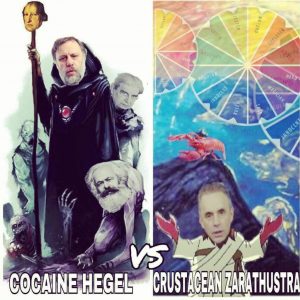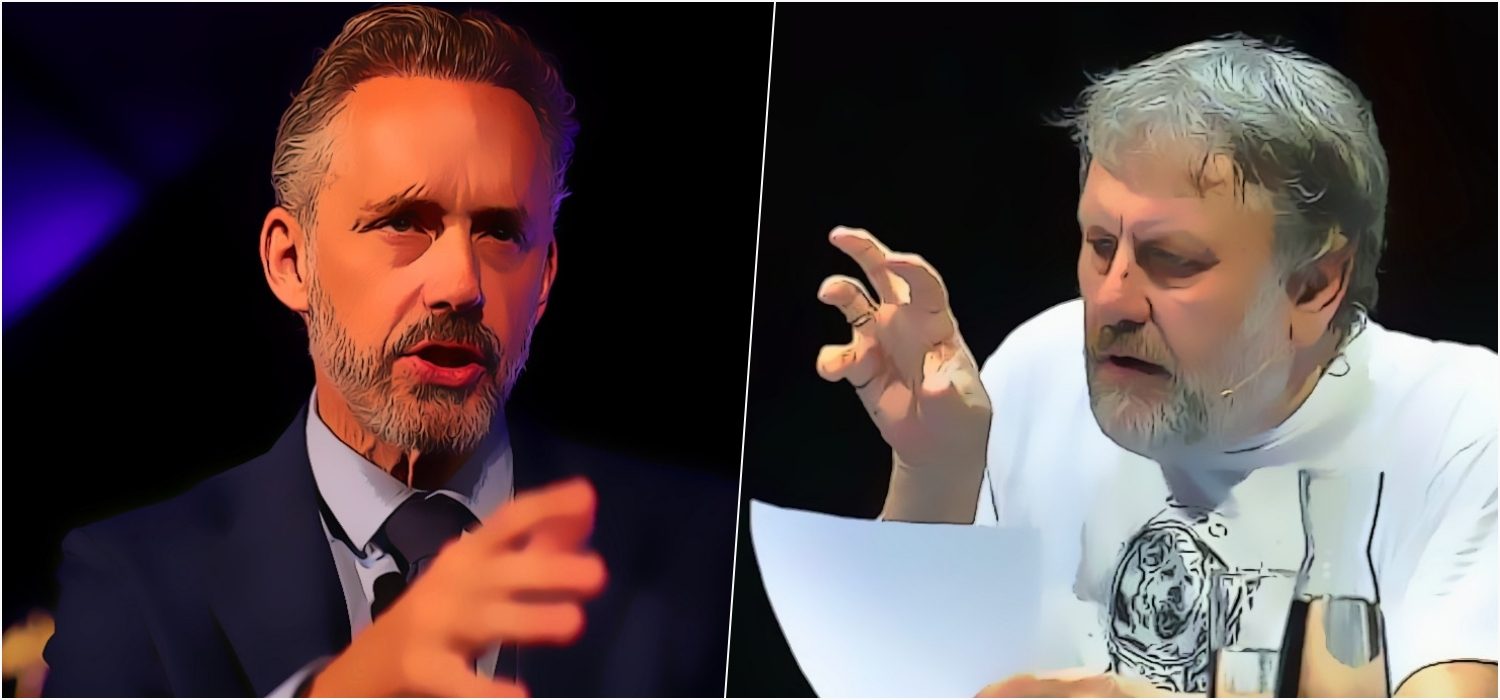The Sony Centre for the Performing Arts in Toronto is an impressive space that seats 3,000 people. It looks and (presumably) feels expensive, with its gold-lit walls and a grand stage that has held entire orchestras, ballets and the casts and crews of elaborate Broadway productions.
On April 20, 2019, the Sony Centre hosted a different kind of theatre, replacing song and dance with something more serious, but as highly anticipated. The event was meant to be the “greatest debate of the century” between Slovenian philosopher Slavoj Žižek and hometown hero/clinical psychologist Jordan Peterson.
Žižek and Peterson were meant to represent the “left” and “right” of the political spectrum respectively, and discuss the topic of the evening – “Happiness: Capitalism vs Marxism.” Tickets sold for up to US$ 500 initially, and the final few sold for an astounding US$ 1500 each. Both Žižek and Peterson represent a new kind of celebrity academic. Shunned by what they call the mainstream academic community, philosopher and psychologist have found fame outside ivory towers, which is why the concert-like proportions of their debate weren’t a huge surprise to those who follow them.
Philosophical underpinnings of Peterson and Žižek
Jordan Peterson rose to notoriety and fame, depending on how you look at it, for his refusal to comply with the politically correct conventions that he felt his fellow Canadian academics were adopting (specifically gender-neutral pronouns). His self-help book 12 Rules For Life is an international bestseller. He’s been criticised harshly by the left, called alt-right and a fascist (definitely a stretch), while his largely young, male audience sees him as some sort of misunderstood pundit.
He’s suave, well-dressed and a very effective orator, but is not in any way a groundbreaking figure. Most of his arguments tend to cherrypick from psychology, Jungian psychoanalysis, Bible readings, and things your successful uncle would say. His appeal, however, shouldn’t be underestimated, nor should his rhetoric. Peterson sells out halls and talks on a regular basis and is one of the leading figures of the gravely misnamed “intellectual dark web”.

Žižek on the other hand, brings to mind the more laid-back, traditional image of the public intellectual. He’s bearded and shabby, his shirt is always stained for some bizarre reason and although he is critical of a number of aspects of the modern left (particularly those that arose from postmodern philosophy), Žižek sits squarely in the socialist domain.
He’s probably most well-known for his feud with Noam Chomsky and media analysis in films like The Pervert’s Guide to Ideology. Žižek is a far less contentious figure than Peterson, but has been criticised by the left for his views on immigration and the LGBT community, aside from theoretical inconsistencies, unorthodox scholarship and grouchy-old-geezer mannerisms.
You’d think Žižek and Peterson would interact like oil and water, but that wasn’t exactly the case.
The debate
Each speaker was given 30 minutes each for an opening, followed by 10-minute rebuttals and 45 minutes of moderated questions and answers from the audience in the theatre and those watching on YouTube. Both looked visibly uncomfortable with the roaring applause they were met with.
The debate began on a dissatisfying note with Jordan Peterson’s opening statement, which was too insipid to inspire either vitriol from his enemies, or enthusiasm from his fandom. He fell back on his dreaded quality of constant self-defence before he had anything to defend. Instead of talking about happiness, communism and capitalism, or address the work of Žižek specifically (which was too vast to be thoroughly read in time, according to Peterson), he chose to “return to the original source of all the trouble” – the Communist Manifesto.
The bulk of Peterson’s opening dialogue was a vulgar re-reading and critique of Marx and Engel’s seminal work, replete with sweeping, reductionist statements like “Marx thought the proletariat was good and the bourgeoisie was evil.” Left leaning publications and individuals have broken his reading down in detail across the internet. He barely dedicated a few ineffective minutes to happiness and capitalism. One wonders who he’s addressing, because as Žižek rightly points out later, Marxism doesn’t really exist in America today the way Peterson thinks it does.
https://www.youtube.com/watch?v=78BFFq_8XvM
Peterson’s opener could have been a great foundation for Žižek to bounce off of, but he chose to stick to a lengthy, meandering speech that began and ended nowhere. Here’s where the commonalities stood out more than the differences; Žižek began by expressing his bitterness towards the attacks aimed at him from left-liberals. He rambled about how the masses are incapable of achieving freedom themselves, and how they need some kind of “master” guiding them. He jumped from Dostoevsky, to Trump to a critique of political correctness.
Peterson watched, clearly enthralled. Žižek presented himself like a cynical nihilist, utterly pessimistic about the future, unable or unwilling to present any possible solution to human happiness in relation to economics (or anything, for that matter). He spoke of Judeo-Christian (“Western tradition”) over and over again, like a broken record player that had been scratching the same Kierkegaard-Nietzsche-Heidegger tune on loop for eternity. And for his grand finale, Žižek berated the audience for their overenthusiastic hoots and cheers.
Anyone who’s read enough about the two speakers would know that the “greatest debate of the century” was anything but.
The problem of blinkered loyalties to ideological paradigms
This isn’t to say that it didn’t have its moments, the conversation, which is a better descriptor than debate, was certainly interesting. Any dialogue is better than none. It’s just that nothing about it felt particularly revelatory. More offensively, it didn’t feel thoroughly researched and their references to and critiques of the “Western” canon felt outdated, and the conversation never ventured beyond the most traditional ideas of Judeo-Christian philosophy. Žižek and Peterson bantered like friends by the end of it and ended up agreeing on more than, this writer thinks, even they expected.
The events’ audience flocked to the hall as tribesmen who belonged either to Team Peterson or Team Žižek, ready to out-applaud the other team like the faceless dots sitting on plastic seats at a football match. Both Žižek and Peterson represent a new era of populist academics who have risen to prominence because they know how to get a reaction from an audience and their peers, even though their ideas are at times academically unsound. This is a dangerous thing. Being part of a team is useful if you’re on a field with a ball, but it doesn’t help if you’re trying to engage with anything critically.
At one point, Zizek says “…we will probably slowly slip into an inevitable catastrophe”. The audience reacted by cheering and laughing. The event had reached the realm of the absurd with the manic, incongruous reactions of a hungry audience that had paid hundreds of dollars just to witness some kind of dialogue between two prominent thinkers on the opposite sides of the political spectrum.
They didn’t seem to mind the underlying sense of pessimism and calamity that thread its way through the conversation. They barely seemed to have heard it at all.
Diya Gupta is an art and culture journalist currently based in New Delhi. You can follow her on twitter at @dovagurp
Featured image credit: Flickr and Qantara

